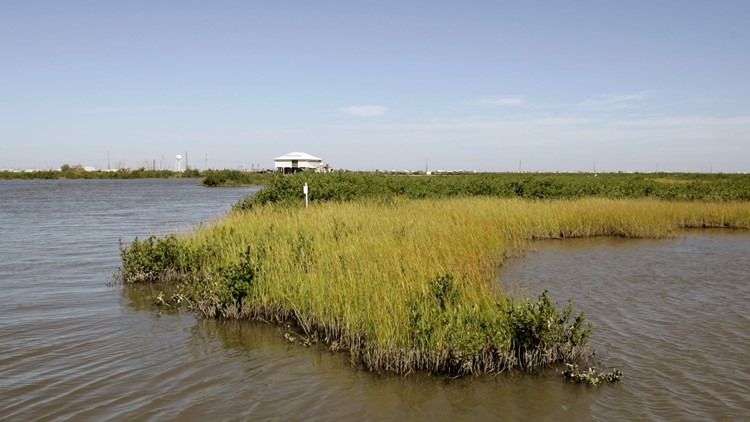NEW ORLEANS — Proponents of a nearly $3 billion project to restore part of southeast Louisiana's rapidly vanishing coastline released a study Tuesday touting the expected economic benefits of its construction, even as the project faces pushback and litigation from communities who fear the environment and their livelihoods will be severely affected.
The Mid-Barataria Sediment Diversion project broke ground in August last year. But construction was halted because of legal disputes, and since June the project has only partially resumed work.
The project is expected to spend around $1.6 billion inside the state over its five-year construction period, according to a new study funded by Restore the Mississippi River Delta, a coalition of environmental groups. During the building phase, the project expects to generate an average of 3,095 jobs across five parishes in Louisiana, mainly in construction and significantly higher-paying than average local wages, the study says.
“This project will bring more wetlands than any other individual restoration project in the world, and it will bring a whopping number of new earnings, jobs and revenue to coastal Louisiana,” said Simone Maloz, campaign director for Restore the Mississippi River Delta, at a Tuesday news conference announcing the study's findings. “It is exactly the scale of the project we need to address the very serious challenge we face.”
The study estimates that for Plaquemines Parish, where the project is being built, the construction will lead to $308.2 million in total wage earnings, $65.4 million in tax revenue and an average of 540 jobs over a five-year period.
But Mitch Jurisich, a third-generation oysterman and parish council representative, was dismissive of the idea that the project would help more than hurt his community's economy in the long term and described the study as “political propaganda.”
His oyster company is one of several plaintiffs, including an environmental group, suing to halt the project on the grounds it will alter water quality, endanger birds and sea life, and kill thousands of bottlenose dolphins in the Barataria basin.
The project, which went through years of assessment before being approved, will divert freshwater from the Mississippi River to bring sediment into the basin's brackish and saltwater marshes.
The aim is to regenerate land in a state where the Gulf of Mexico eats the equivalent of a football field of land every 100 minutes as sea levels rise because of climate change, according to estimates from environmental groups.
Barataria and the neighboring Breton Basin have collectively lost an estimated 700 square miles of land. Leveeing of the Mississippi River is seen as one of the main forces that has disrupted the natural, restorative build-up of sediment. The diversion project is expected to add between 20 to 40 square miles of new land over the next five decades.
Jurisich, who is also chairman of the Louisiana Oyster Task Force, said he is concerned the project will irretrievably damage the oyster, fishing and tourism industries. His parish is home to 70 percent of all commercial landings for oyster, crab, finfish and shrimp. Statewide, the oyster industry alone earns around $317 million annually and provides nearly 4,000 direct jobs, according to the Oyster Task Force.
“The project is going to destroy our way of life,” Jurisich said. “What's left? A skeleton of a local community which can't support the local businesses because they can't support themselves.”
The study did not analyze the economic benefits of the project once it begins operating. But it states that a total of $378 million has been set aside by the project to mitigate impacts on communities, including to construct bulkheads, elevate docks and homes and offer buyouts for residents seeking to relocate. Around $54 million within this budget has been earmarked for building new oyster beds and expanding old ones, along with gear improvements and marketing for the seafood industry.
While opponents of the project call for less-invasive responses to land loss in the basin such as rebuilding barrier islands, Maloz argues the project should be seen as part of a broader and necessary effort to address the scope of the state's mounting land loss.
Louisiana’s Coastal Protection and Restoration Authority and Plaquemines Parish issued a joint statement in June saying they “are working toward a mutually acceptable path forward for the Mid-Barataria Sediment Diversion.”
► Get breaking news from your neighborhood delivered directly to you by downloading the new FREE WWL-TV News app now in the IOS App Store or Google Play.



